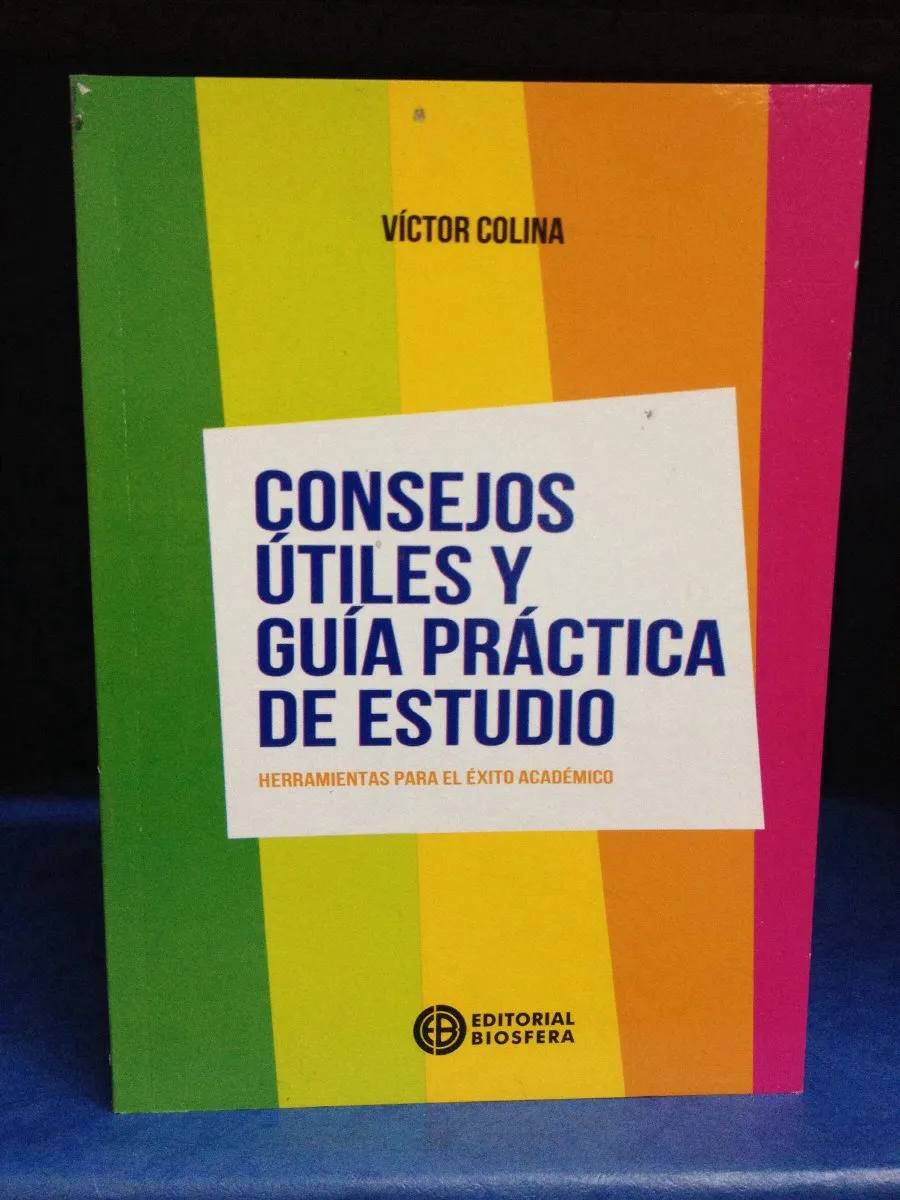I am proud to make a post about this book, whose editor is a Venezuelan. Víctor Colina, administrator of human resources, magister in industrial relations, with a specialization in labor law and a long career as an advisor in the area of training and training of human resources.
This book gave me the necessary tools to be an excellent student during all my phases of study, allowing me to be a more organized person, more studious and anxious to acquire knowledge.

SOURCE

Introducing in the content, the book is divided into practical XII Chapters, let's see them:
Chapter I: The Excuses. Many times, the most practical to justify irresponsibility is an excuse, we must get rid of them, be aware of our mistakes, take responsibility and comply with the established.
Of humans it is doing something wrong, but it is foolish to remain in such a situation. </ B> Marco Tulio Cicero (106 BC-43 BC), politician, philosopher and Roman writer.
Chapter II: Beginning at the beginning. It seems obvious that one should start at the beginning, however, many ignore this basic and elementary principle.
• 1st. It must be clear in what position the studies are on the scale of your activities.
• 2nd. Respect that hierarchy where the studies are located and continuously respect the working time of study, this is not more than the schedule set by you to study according to your priorities.
• 3rd. Carry out a Planning of how to study, then supervise this planning, and if necessary, make changes, finally, evaluate the study carried out and determine if it was effective or not.
You can not untie a knot without knowing how it is made. </ b> Aristotle (384 a.C.-322 a.C.), Greek philosopher.
Chapter III: Attendance to Classes. It is assumed that if you study you must attend classes, but it is not always the case. I do not mean the modalities of distance study, based on the androgogy, I mean that many students attend classes in present physical body but with the mind absent, that is, they are but they are not in classes. This lack is one of the main causes of student failure. Attending classes with your five senses placed in them gives you the path to success.
Freedom assumes responsibility. That's why most men fear so much. </ b> George B. Shaw (1856-1950), Irish author.
Chapter IV: Concentration. You must concentrate on all study activities, since concentration is closely linked to these and in particular to the learning process, and to the acquisition of new knowledge.
The supreme degree of knowledge is to contemplate the why. Sócrates (470 a.C.-399 a.C.), Greek philosopher.
Chapter V: Structuring Matter. The pensum, tremendous tool for the student. This is the chapter where we make a combination of two previous points plus this aggregate; the study time, study schedules and the curriculum, making a good combination of these, you get great potential.
Work takes away from us three great evils: boredom, vice and necessity. </ b> François Voltaire (1694-1778), French philosopher, historian and writer.


Chapter VI: Breaking Myths. Myth, in our case, is a belief that forms around an idea as a model or example to follow. Breaking myths and paradigms has never been easy, and that is why successful students are testing and varying their methods of study, changing paradigms and breaking myths in order to achieve satisfactory results.
Knowing that you do not know, that's humility. To think that one knows what one does not know, that is disease. </ b> Lao-Tse (570 a.C.-490 a.C.), Chinese philosopher.
Chapter VII Preparing the summary. The proposal of this chapter is to make summaries of the contents that you see, this from the 1st day of classes, filed in a folder that identifies the content and is inside another that identifies the educational period. These are activities to be done in the study time.
Reading is a conversation with the most illustrious men of the past centuries. </ b> René Descartes (1596-1650), French philosopher, mathematician and physicist.
Chapter IX: Work or study in a team. This is a very important topic in the student and work area. Working as a team is the fundamental basis of society, if our parents and grandparents had not worked as a team, at least sometimes in their lives, we would not have evolved as a society. That is why it is essential to have skills that allow you to study and work as a team.
The wise seek wisdom; the fools believe they have found it. </ b> Napoleon Bonaparte (1769-1821), military man and French ruler.
Chapter X: S.O.S. Asking for help, the successful student is aware that asking for help is not a sign of weakness, but rather, a show of intelligence, doing the right thing by asking for help at the time it is required.
I slept and dreamed that life was beautiful; I woke up and realized that life was a duty. </ b> Immanuel Kant (1724-1804), German philosopher.
Chapter XI: Copy and cheat. This is an action very similar to the 1st chapter (the Excuses). A successful person never uses the traps, putting your skills below them and throwing your rating at random is an act of irresponsibility and unconsciousness.
Thinking and being are the same thing. </ b> Parmenides (515 a.C.-580 a.C.), Greek philosopher.
Chapter XII: By way of summary or conclusions. This last chapter closes with three 3 words; Study, dedication and commitment are the key to success, since the successful student is not born, it is done.
Whenever you teach, teach at the same time to doubt what you teach. </ b> PJosé Ortega y Gasset (1883-1955), Spanish philosopher and essayist.
"Remember, study to learn, to apprehend and for life, not for the exam or pass the subject."



Photo of my authorship.

I wish that these study techniques are to your advantage and usefulness as they were to me!
Best wishes to you, thanks for reading, blessings!
